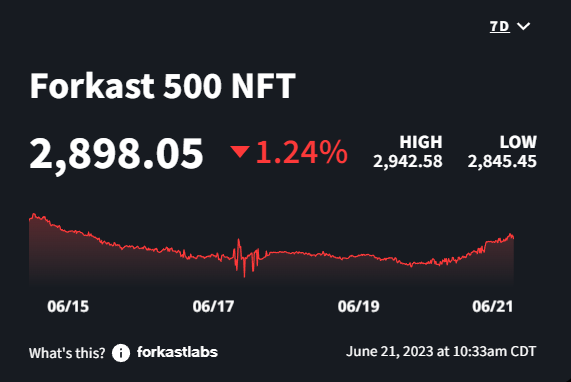Wall Street-backed crypto exchange a sign of lingering interest despite SEC’s crackdown
In this issue
- EDX Markets: Interest despite crypto crackdown
- Forkast 500 NFT Index: Cautious NFT traders
- Alibaba: New leader eyes Web3
From the Editor’s Desk
Dear Reader,
It’s been some time since established Wall Street heavyweights made headlines by wading into the cryptocurrency space, so news of this week’s launch of the EDX Markets crypto exchange is refreshing, given the gloomy tone of developments in the industry — particularly in the United States — in recent months.
The fact that said heavyweights — whose ranks include Charles Schwab, Citadel Securities, Fidelity Digital Assets and Sequoia Capital, as well as BlackRock, which last week filed to potentially launch America’s first publicly traded spot Bitcoin exchange-traded fund — are showing renewed interest in the sector following a barrage of enforcement action by the Securities and Exchange Commission may come as a surprise to some. Yet there’s almost a sense of déjà vu about the way this apparent revival of TradFi’s crypto mojo returns us to a question that has long preoccupied many industry observers: Is this the moment that crypto goes mainstream?
Given the severity of the actions taken by the SEC and the resulting turmoil in the sector, posing such a question may seem perverse, but every industry in history has undergone unintended and disruptive change — a process Austrian political economist Joseph Schumpeter characterized as “creative destruction.”
When it comes to creative destruction, we might turn to an expression coined by another Austrian, philosopher Friedrich Nietzsche: “That which does not kill us makes us stronger.” For our purposes, let “us” refer to the crypto industry. And from this perspective, the SEC’s crackdown on crypto and the consequences to which it has given rise may in fact be said to have aided the sector’s longer-term development, despite the obvious short-term setbacks.
Schumpeter’s theory of creative destruction has been borne out time after time, so ample reason exists to have faith in further progress even amid present-moment difficulties. It’s a faith that we at Forkast are fortunate to possess and proud to nurture in our capacity as fellow travelers on crypto’s fascinating journey.
And as a mark of that faith, we’re pleased this week to launch a new section in The Current Forkast, featuring insights gleaned from our suite of digital asset indexes, which measure the market performance of non-currency digital asset trading on various blockchains. Check it out and benefit from the information these unique tools provide as a critical bellwether of market sentiment and broader market dynamics.
Until the next time,
Angie Lau,
Founder and Editor-in-Chief
Forkast.News
1. Lingering interest

EDX Markets, a new crypto exchange backed by major Wall Street players such as Fidelity Investments, Citadel Securities and Charles Schwab, will offer Bitcoin, Bitcoin Cash, Ethereum and Litecoin trading services. The launch, which echoes BlackRock’s Bitcoin exchange-traded fund (ETF) filing last week, reflects the institutional interest in cryptocurrencies despite SEC’s crackdown on the industry.
- Bitcoin, Bitcoin Cash, Ethereum and Litecoin are not named securities by the U.S. Securities and Exchange Commission.
- New Jersey-based EDX has also completed a new funding round from investors, including options exchange operator Miami International Holdings and affiliates of proprietary trading firms DV Trading, GTS, GSR and Hudson River Trading, the exchange said in a press release Tuesday.
- Unlike other centralized crypto trading platforms, EDX said it adopts “non-custodial model designed to mitigate conflicts of interest,” which means the exchange does not directly handle customers’ digital assets. Instead, it operates similarly to traditional stock markets where brokerage firms book orders from investors, as reported by The Wall Street Journal Tuesday.
- EDX also plans to introduce a clearinghouse later this year to facilitate the transactions and exchange of payments, but will still refrain from directly holding investors’ assets.
- The risks intertwined with custodial models became evident last year with the collapse of the Bahamas-based exchange FTX. The U.S. SEC also leveled allegations against Binance, the largest cryptocurrency exchange in the world, accusing it of mixing customer assets.
Forkast.Insights | What does it mean?
In a move that has sent shockwaves through the cryptocurrency world, the recent launch of Fidelity and Schwab-backed EDX Markets has raised concerns about increased regulatory pressures from the U.S. SEC and the perceived encroachment of traditional finance into the crypto space. This development, coming hot on the heels of BlackRock’s application for a Bitcoin spot ETF, signals a shift in the dynamic between the fledgling crypto industry and the established financial powerhouses.
BlackRock, as the world’s largest asset manager, is a formidable player. With an impressive track record of a 575 to 1 success rate with the SEC for ETF filings, it’s a force that’s hard to ignore. Its unprecedented move into the Bitcoin ETF space — a domain where the SEC has so far shown relentless rejection — may point to a seismic shift in crypto markets, potentially tipping the scales in favor of traditional finance, a scenario that’s not sitting well with many in the Web3 industry.
Such concerns are compounded by the recent scrutiny faced by notable entities in the crypto banking sector — Silvergate Bank, Silicon Valley Bank and Signature Bank. These events have been labeled as “Operation Chokepoint 2.0” by critics, a nod to the perception that these enforcement actions are part of a larger regulatory strategy to unbank the crypto industry.
Recent punitive measures against major U.S.-based crypto exchanges like Binance and Coinbase arguably lend credence to this narrative. The vacuum left in the wake of these actions opens opportunities for traditional financial institutions to carve out a larger piece of the lucrative crypto pie in the world’s biggest economy.
However, this trend is not confined to the U.S. shores. The interest of TradFi in digital assets is gaining momentum globally. Deutsche Bank’s application to operate as a crypto custodian in Germany and Hong Kong’s recent overtures to its major lenders to embrace the crypto industry are cases in point.
2. NFT markets smile

The Forkast 500 NFT Index declined 1.24% this week, but following double-digit losses just one week ago, the current decline can be interpreted as positive.
This week has brought plenty of bullish news, and it’s beginning to counteract the recent FUD (fear, uncertainty and doubt) across the crypto industry. But traders remain cautious with their funds, spending their money on established projects instead of new mints.
- The Ethereum NFT Composite lost 4.31% from a lower index impacting the average sale price in some of the top NFT projects.
- The average sales price for Bored Ape Yacht Club (BAYC) in May dipped to a low of US$80,000, unseen since July 2021, with a slight improvement this month, averaging at US$84,000.
- BAYC spin-off Mutant Ape Yacht Club’s average sales price this week fell to US$15,000, its second lowest level since the collection’s inception in August 2021.
- Doodles’ average sales price stood just under US$4,000 over the past seven days, nearly even with last week but down from the beginning of June when it stood at US$4,300.
- Moonbirds’ average sales price decreased 17% from US$3,968 to US$3,364.
- Ethereum saw a 9% decrease in total U.S. dollar sales volume, as Polygon fell 20%, while the Solana blockchain’s total sales volume increased by 4.99%. The Solana NFT Composite strengthened 2.35%, also aided by SOL regaining some of its value following the scare of the SEC labeling it as a security.
Forkast.Insights | What does it mean?
While the index represents the value of the non-fungible tokens market, it also reflects trader sentiment. If the chart looks like it’s trying to smile, well, that’s how traders feel right now. However, only the bravest of builders would dare release a new NFT collection in this current market.
Developers often say building happens during the bear market, and that was on full display this week with a technical innovation that arrived on Ethereum in the form of Ethscriptions (Ethereum’s version of Bitcoin’s inscriptions). Providing a cheaper on-chain storage solution by using transactions’ call data, NFT traders can now store images on-chain for under US$1 as opposed to the hefty fees that NFT contract storage requires. Time will tell if the new protocol will catch on and lead to further innovation, but so far, over 150,000 ‘ethscriptions’ have been created, showing that there may be legs to this new blockchain collectible.
Yuga Labs, the firm behind top NFT project BAYC, revealed its HV-MTL forge, a mobile gaming experience in-line with their previous Dookey Dash. The HV-MTL collection saw a quick pump in sales this week, with over US$1.1 million in secondary action. This may be the start of an uptick in Yuga Labs’ and other projects’ game offerings, as many expect an explosion of p2e gaming in an attempt to win over the masses.
Speaking of the masses, Fortnite’s 242 million-strong user base was exposed to NFTs on Tuesday thanks to the game’s new integration and mini-event with Nike’s dotSwoosh. Playing just 10 minutes in Fortnite’s new Airphoria event will unlock an achievement and NFT on the dotSwoosh platform, providing its holder with access to a future Nike dotSwoosh NFT shoe drop. Players can also purchase a new skin pack using v-bucks to unlock a bonus NFT on the dotSwoosh platform. Nike will soon enable their secondary marketplace for their digital shoes, and we’re expecting to see some impact on the Polygon NFT Composite.
These types of innovations are sometimes under-appreciated in the bear market, but in the future we will likely look back at this time as a pivotal moment for NFTs, when mass adoption was quietly happening right under our nose.
3. A friendly face

China’s e-commerce giant Alibaba Group Holding Limited’s incoming chairman Joseph Tsai is a vocal proponent of Web3 technologies and has multiple investments in the crypto space. In a leadership shuffle announced Tuesday, Tsai, who is currently Alibaba’s executive vice chairman, will succeed Daniel Zhang as chairman.
- Taobao and Tmall chairman Eddie Yongming Wu will take over from Zhang as chief executive officer, according to an Alibaba press release. The appointments will take effect on Sept. 10.
- Tsai was one of Alibaba’s co-founders in 1999. He holds citizenships in Taiwan and Canada, and is a permanent resident of Hong Kong.
- The crypto industry might be impacted by the appointment of Tsai, who tweeted “I like crypto” in December 2021.
- Blue Pool Capital, a Hong Kong-based investment firm that functions as Tsai’s family office, has invested in numerous Web 3.0 companies, including Polygon Technology and NFT firm Artifact Labs, according to business information platform Crunchbase. Blue Pool was also one of several Hong Kong backers of the now-collapsed crypto exchange FTX, according to SCMP.
- Tsai is also the governor of the Brooklyn Nets of the National Basketball Association that announced a partnership with blockchain-based fan engagement platform Socios.com in October 2021, and introduced Netaverse — a virtual reality broadcast service of basketball games — in January 2022.
Forkast.Insights | What does it mean?
The appointment of Joseph Tsai as Alibaba’s new chairman may be seen in some quarters as a sign that China’s biggest e-commerce company, which also operates the country’s largest cloud computing and digital payment platforms, is fully embracing Web3. After all, Tsai has long burnished his credentials as a Web3 booster, enhancing a reputation backed up with cash that he has invested in the industry, including in crypto.
Some of the more excitable elements in the cryptocurrency community may even regard Tsai’s appointment as a sign that China Inc. — and, by implication, the ruling regime in Beijing — may be warming up to crypto, following a lengthy period of hostility to the phenomenon that has seen it banned outright for almost two years.
That notion seems fanciful, to say the least, given the vice-like grip the Communist Party exercises over China’s financial system, in which any alternatives to its own arrangements and prerogatives are seen as threats that must be crushed without hesitation.
But leave aside crypto, specifically, and Tsai’s new role may be seen as an indication of where corporate China — and, again, the regime — is placing its bets.
China’s blanket rejection of cryptocurrency does not extend to other aspects of Web3 development. Indeed, Beijing has shown itself to be an enthusiastic proponent of blockchain technology and other elements of the Web3 universe — so long as they serve the fulfillment of its own development goals.
Alibaba didn’t attain its stellar success without making smart bets. Nor did it flourish so spectacularly without a nod and a wink from Communist Party bosses — a crucial element of success for any business that aims to thrive in China.
From this perspective, Tsai’s elevation to a top job at Alibaba (of which, incidentally, he is a founder) indeed suggests that the company is betting on sustained and increasing support for Web3 from Beijing — although that support is unlikely to extend to crypto. The outcome of this — to borrow a phrase — appears inevitably to be “Web3 with Chinese characteristics.”